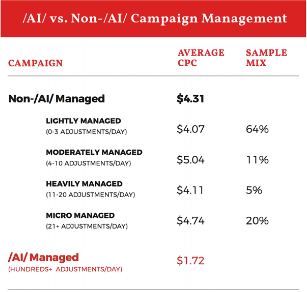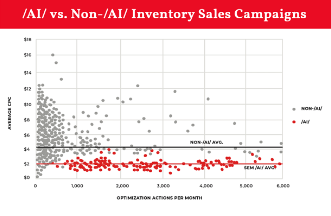We are at the precipice of a fourth industrial revolution — a period of great change that will be driven by rapid advances in artificial intelligence. These changes will impact every industry as machine intelligence takes an increasingly significant role in processing and acting on the multitude of data surrounding every kind of interaction, including human interactions with technology. Let’s face it, machines are just better than humans at finding patterns in historical data and using them to predict the future.
Advancements in machine learning are already providing strong benefits in the online environment, including digital advertising. This should come as great news for automotive marketers given that the auto industry spends more on advertising than any other industry except retail.
According to the 2017 NADA report, the average dealership spends $48,285 in advertising each month, including $26,750 in digital marketing. Further research has shown that the average dealership spends nearly $8,000 on search engine marketing (SEM) each month — a number that is constantly growing to new highs. Given the complex nature of SEM, plus the plethora of data collected with each individual search, this space is ripe for pairing with machine cognitive processing.
Automotive SEM Complexities
Advertising has always been about getting the right message in front of the right person, at the right time. For automotive sales managers, the objective should be to put an inventory-based message in front of a low-funnel shopper moments after the shopper has decided on a particular vehicle, but before the shopper has selected which dealerships to shop. Sounds simple, but consider a few of the many complexities.
First, there are the customer complexities. People engage in automotive-related search queries for a variety of reasons — enthusiast-related interest, service and parts, early funnel research and low-funnel shopping, to name a few. Discerning customer intent in a sea of searchers can be a challenging task.
Second, there are inventory complexities. Individual vehicles have unique characteristics. Multiply that uniqueness by the number of vehicles a dealership keeps in stock and factor for consistent sales, trades and purchases and it quickly becomes overwhelming to manage the details necessary to run successful SEM campaigns.
Third, there are competitive complexities. At any given moment, dealerships are faced with competitive pressures from other dealerships, third-party classifieds and OEMs. Changes in SEM activity from competitors have a measurable impact on a dealership’s performance. Therefore, a well-managed SEM campaign must continually adjust for competition in order to remain highly relevant.
Delivering Relevance Amidst Complexity
In the absence of a capability to create and manage highly targeted search campaigns at the scale required for optimal performance amidst a complex digital environment, most existing SEM solutions cast a wide net by bidding on broad keywords that encompass as many searchers as possible. Knowing that the search will pick up a broad range of shoppers and non-shoppers, dealership marketers then create general ad copy and direct traffic to a homepage where shoppers must make several navigational selections before coming to the relevant inventory page.
For better results, dealers must satisfy shopper intent by investing in inventory-specific keywords, creating ad copy that is specific to the query, and linking directly to the VDP or SDP.
Next, dealership marketers must constantly micromanage SEM campaigns to adjust for shifts in shopper trends, inventory and competitive pressures. This approach benefits quality scores leading to higher impression share, lower CPCs and stronger shopping engagement and conversion metrics. Herein lies the problem — it takes a tremendous amount of time and savvy to monitor and adjust. This task is not just tedious, it’s nearly impossible to accomplish manually.
Improving SEM with AI
There’s a strong case for the use of artificial intelligence to address these challenges and significantly improve dealership SEM performance. During the last two years, we have built AI-powered SEM campaigns for dozens of dealerships. We have also studied more than 1,000 inventory-based SEM campaigns managed by dealerships, vendors and agencies. What we found is that the overwhelming majority of campaigns fit into the proverbial “set it and forget it” or lightly managed categories. We also found that campaigns micromanaged by non-AI technologies do not yield consistent performance uplift.


The clear conclusion is that AI has an unparalleled ability to consistently and smartly manage SEM in ways beyond the reach of even the best marketing managers and non-AI vendor technologies.
The future of dealership search engine marketing can be simple and powerful when paired with advanced artificial intelligence. Without decision makers such as general managers, dealer principals and owners accepting and applying artificial intelligence to their search engine marketing, they will fall behind and continue to attract the wrong shoppers at a higher cost. With AI-efficiencies, dealers will have complete control of their search engine marketing — without jeopardizing their time or marketing dollars. It’s a smart balance.














